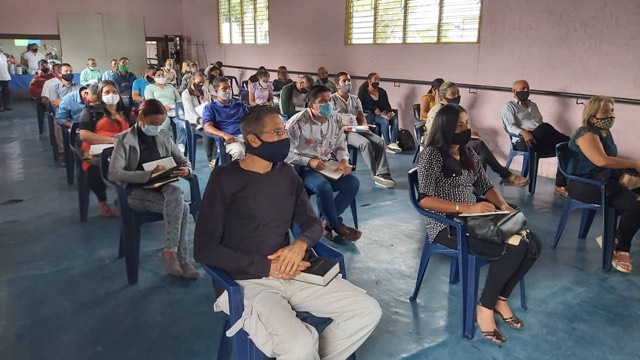Rev. Dr. Warren Lathem, a retired Elder in the UMC, North Georgia, is the founder and President of Venezuela Now, Inc (VNI), a US non-profit supporting the ministries of the Seminario Wesleyano de Venezuela, the Wesley Medical Centers, and the Methodist Church of Venezuela. Last year, VNI shipped 1.25 million meals and $2.5 million worth of medicines to Venezuela. He served 18 years as Senior Minister of the Mount Pisgah UMC in Johns Creek, GA where during his tenure worship attendance grew from 75 to an average over 3,000. The former District Superintendent resides in Rome, GA with Jane, his wife of 48 years. He originally wrote the following on Facebook last Friday, reflecting on his recent work with a global-missions-focused task force of the Wesleyan Covenant Association (WCA) and global missions in the next Methodism, among other things. Reposted with permission.
UM Voices is a forum for different voices within the United Methodist Church on pressing issues of denominational and/or social concern. UM Voices contributors represent only themselves and not IRD/UMAction.
Long ago it was clear to me the Traditional and Progressive church needed to separate. When it was first publicly expressed at a General Conference breakfast, the speaker was virtually crucified. Now most reasonable leaders in the UMC know it is inevitable, if not desirable from their perspective.
Even the North Georgia Bishop said after the debacle of the 2019 General Conference, “If the Methodist church has to get leaner and nicer, I’m all for it. I’m tired of the meanness. I’m tired of the pettiness. I’m tired of the fighting to win at all costs.” (Bishop Sue, quoted in the Washington Post.)
This inevitability has erupted in coercive, abusive tactics by some leaders in the denomination. I’ve said enough about that. My primary concern is not what is wrong in the UMC. That list is very long.
What is ahead? Exciting times for the church in mission to the world.
For well over a year, I have been privileged to work with some of the most effective mission leaders in the UMC. We have been focusing on what Global Mission could look like in the New Methodism, now known as the Global Methodist Church.
We knew we did not want to take dysfunctional mission practices into the new church. Every one of us had very negative experiences with the General Board of Global Ministries (GBGM) of the UMC. It is a long list. Personally, I could write a book on the ineffectiveness and the failure of the Board. I could also document their agenda driven abuse of their charge. Suffice it to say, it is broken beyond repair.
So how will the Global Methodist Church do global mission if we are in fact going to do it a different way? The first thing we knew was we did not want to repeat the institutional, top heavy, top-down administration of the mission of the denomination. We did not want to create an unaccountable bureaucracy which serves the employees and their agendas far more than the mission.
So our first realization was we did not need to create the mission. We needed to identify those in our Wesleyan family already doing effective mission and partner with them. There are dozens, perhaps hundreds of these missions who have been effective in ministry with no support from the GBGM, often in spite of them. We also want to encourage many new initiatives to unreached people groups.
Some examples will illustrate this. We recognize these missions are cost effective, multiply disciples and advance the cause of Christ.
An example: International Leadership Institute, founded and led by Drs. Wes and Joy Griffin, both elders in the UMC and former missionaries. ILI has trained more leaders than any UM leadership training in our history, over 300,000 (I think) to date. They do this with minimal financial cost compared to denominational efforts. We know we need to train Christian leaders within our Wesleyan tradition. Why would we not partner with folks already doing this instead of trying to create something that we have no idea how to do? Therefore, instead of a Board and its related costs and ineffectiveness, we will partner with folks already doing the work.
Mike and Sherrie Morrissey have been missionaries in Thailand for many years. These Kentucky UMC ministers established a mission organization called Thailand Now to reach the lost of that country and surrounding countries. Their work is far more effective in that region than anything done by our denominational board. So if someone or a church wants or is called to do mission in Thailand, our denominational goal will be to link them with this mission rather than trying to create a new mission from a headquarters in Atlanta. They do effective ministry in a very cost-effective way. We want our new church to support that, not compete with it or fight against it.
A great example of this Mission Partnership is the work of Dr. Peter Pereira in India through his ministry, Hope for Today. An elder in the Northern Illinois Annual Conference, Peter, a native Indian, has built a great ministry. We will partner with this and similar works.
I should probably say Venezuela Now, Inc. is one of these Partners. But that would seem self-serving. Nevertheless, VNI is one of the approved global mission partners!
We will also partner with traditional mission sending agencies like TMS Global and One Mission Society. We do not need a denominational mission sending agency when we have extremely effective agencies already in our Wesleyan family. We will refer potential missionaries to an agency such as these to determine their fitness for mission and provide their training and means of raising their support. They will deploy and supervise these missionaries. They have a proven track record for both effective ministry and cost effectiveness. Further, they are self-funding which creates a seminal relationship between the missionaries and the supporters of the missionaries.
There are many other examples. One of the criteria we look for is their effectiveness in raising up national leaders, birthing a culturally appropriate Wesleyan church. Another is effectiveness in church planting. Another is transformational ministries. Another is effectiveness in making disciples. Another is commitment to Traditional Wesleyan theology and doctrine. Another is fiscal responsibility and cost effectiveness. And there are other traits we examine before approving a mission for inclusion in this list of mission partners.
Our work is not limited to establishing Global Mission Partners. We are working to identify best practices for engaging the local church in mission, identifying leaders, both national and international leaders with the spiritual gift of Apostleship, and we are working to develop a Wesleyan resource library to support all of this.
A lot of folks have worked very hard to get this effort organized and approved by the Wesley Covenant Association in preparation for the launch of the Global Methodist Church. We have done this via Zoom throughout this pandemic, making possible many leaders from across the planet engaged in mission giving their best input to this work.
One of the principles we wanted to be sure to employ was “From everywhere to everywhere,” not “From the West to the rest.” This has been a truly global effort.
As I write this I am in Montgomery Alabama for the Global Gathering on Saturday. But tonight, Friday, our Global Mission Team will gather for our first in-person meeting. We will include via Zoom those who could not travel here, making sure to maintain our Global Focus.
Emil Brunner said, “The church exists by mission as the fire exists by burning.” It is clear effective churches have global mission in their DNA. This effort in Global Mission Partnership is one of the most exciting developments in the emerging Global Methodist Church.
Pray for this work. Get excited for the potential for fulfilling the Great Commission. Engage in mission, through deep, strong relationships. Give to these proven mission entities.






Comment by Rev Wilton Odongo on May 8, 2021 at 12:37 am
Whereas it will be good to use existing mission teams that has been doing some work in africa. It is important to noted that some of this mission team has not directly been doing mission with the United Methodist church. They have established own entry and planting churches , building churches and not promoting their own Methodist . What will be different with gbgm which has also to some extent been doing mission sometimes with ecumenical churches or organisation and instead of empowering its own as a way of evangelisatio n. I think we need to rethink how the new GMC will establish or approach it’s global mission engagements in central conferences. Otherwise , this trajectory Rev Mark Toley is presenting may be dangerous and will disadvantage most missions areas as well like what we already have.